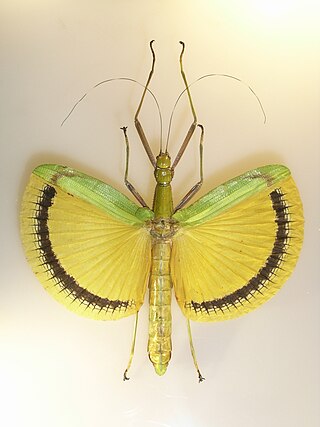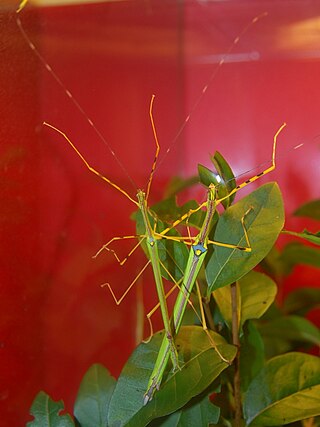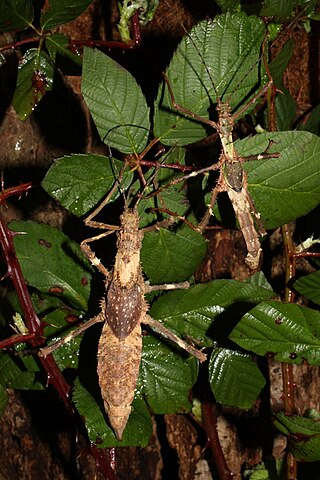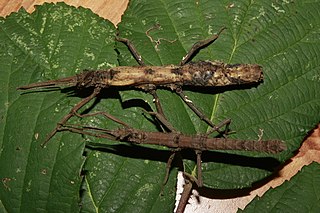
Carausius is a genus of the tribe Lonchodini, in the order Phasmatodea. The genus is in many ways typical of the Phasmatodea in that all species are twig-like in appearance. These species are parthenogenetic.

Phobaeticus is a genus of Asian stick insects comprising over 25 species. The genus includes some of the world's longest insects.

Necrosciinae is a subfamily of the stick insect family Lonchodidae, with its greatest diversity in South-East Asia.
Asceles is a genus of stick insects in the tribe Necrosciini. Some of the species of Asceles have a distribution in Malaysia and Singapore.

Sipyloidea is a genus of stick insects of the family Lonchodidae. Species have been recorded from India, China, Indochina, through to Australasia. The genus was described by Brunner von Wattenwyl in 1893.

Aschiphasmatidae are a family of stick insects belonging to the suborder Verophasmatodea; they can be found in Indomalaya.
Dajaca is a genus of stick insects belonging to the suborder Verophasmatodea, family Aschiphasmatidae and is the only representative of the monotypic tribe Dajacini. Species have been recorded from Borneo, Vietnam, Hong Kong and Myanmar.

Marmessoidea is an Asian genus of stick insects in the family Lonchodidae and subfamily Necrosciinae. The native range of species appears to be from India and South-East Asia to the Wallace line.

Necroscia is an Asian genus of stick insects in the family Lonchodidae and tribe Necrosciini. Species have been recorded from South-East Asia.

Lopaphus is an Asian genus of stick insects in the tribe Necrosciini. Species have been recorded from India, China and South-East Asia.

The Lonchodinae are a subfamily of stick insects in the family Lonchodidae found in: Australasia, Asia, Africa, Southern America and the Pacific.

Calvisia is a genus of stick insects in the subfamily Necrosciinae. Species are known to be distributed in temperate and tropical Asia.

Neoclides is an Asian genus of stick insects in the subfamily Necrosciinae. Species have a known distribution from: Indo-China, Borneo, Sumatra, Philippines and New Guinea.

Haaniella is a genus of the Phasmatodea family Heteropterygidae from Southeast Asia.
Pseudodiacantha is an Asian genus of stick insects in the family Lonchodidae and subfamily Necrosciinae. Members of Pseudodiacantha are excellent examples of camouflage, as they are known to cover themselves in mossy or lichenous outgrowths that supplement their disguise.

Neohirasea is a genus of stick insects in the tribe Necrosciini, erected by J.A.G. Rehn in 1904. Species has been recorded from temperate and tropical Asia, including: China, India, Japan, Malaysia and Vietnam.
Maculonecroscia is a genus of stick insects in the tribe Necrosciini, erected by F Seow-Choen in 2016. Species distribution records are probably incomplete, but include India, China, Indochina (Vietnam) and west Malesia.
Scionecra is a genus of Asian stick insects in the tribe Necrosciini, erected by Heinrich Hugo Karny in 1923. Species have been recorded from: China, Vietnam, Malesia through to Australia.
Planososibia is a genus of Asian stick insects in the tribe Necrosciini, erected by Francis Seow-Choen in 2016. Species have been recorded from: Sri Lanka, Tibet, China, Vietnam and Malesia.

Pylaemenes mitratus is a species of stick insects (Phasmatodea) native to Malay Peninsula and Sumatra. The species is also known by the common name Money Plant Stick Insect, which refers to the most well-known food plants, Epipremnum aureum, which is also known as money plant.













